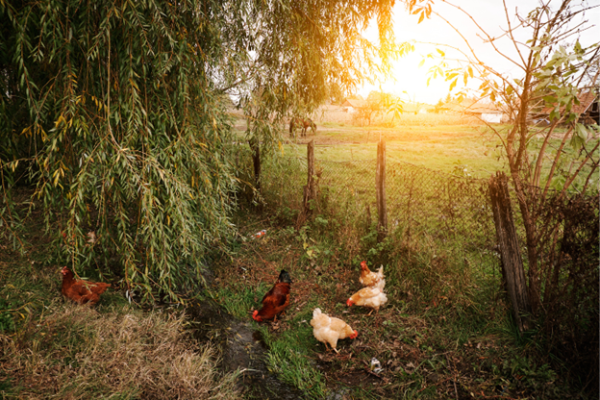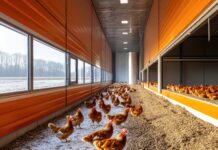Have you ever considered raising chickens in your garden? What aspect appeals to you the most – the prospect of fresh eggs, natural pest control, or something else entirely?
Raising chickens in your garden has gained popularity as a sustainable and rewarding practice for homeowners and urban dwellers alike. While having a constant supply of fresh eggs and natural pest control is enticing, it’s essential to weigh the cons and pros before diving into backyard poultry farming. So, in this blog, we will discuss the hidden truths behind this feathered garden companionship.
Pros of Chickens in Gardening
Natural Pest Management
One of the primary benefits of chickens in gardening is their natural ability to control pest management. Chickens are voracious eaters of various insects like aphids, ticks, and grubs. They also feed on larvae, reducing the number of future pests. This behavior not only reduces the need for chemical pesticides but also helps maintain a balanced and healthier ecosystem by controlling pest populations naturally.
Clearing Unwanted Plants and Dropped Fruits
Chickens’ foraging habits extend to consuming unwanted plants and dropped fruits. They particularly enjoy eating various weed species and overgrown grasses. By allowing chickens to graze in designated areas, you encourage removing plants that would otherwise compete with your cultivated crops for nutrients, water, and sunlight.
Additionally, fallen fruits can harbor pests and diseases, and chickens help prevent these potential sources of infestations from accumulating.
Efficient Organic Waste Recycling
Chickens are omnivores with a varied diet, making them ideal for recycling kitchen scraps. Leftover vegetable peels, fruit rinds, eggshells, and even small quantities of cooked grains are eagerly devoured by chickens.
By feeding them these kitchen scraps, you convert what would have been discarded into valuable resources like eggs and manure. This practice reduces the amount of waste that enters the waste disposal system while providing you with fresh, home-produced eggs.
Natural Soil Tilling Alternative
Chickens’ scratching behavior serves as a natural and efficient method of soil aeration and tilling. As they scratch the soil, they create small furrows and pockets, breaking up compacted earth and allowing air and water to penetrate deeper. This helps to alleviate soil compaction, enhance root growth, and build a more favorable environment for soil microorganisms.
Minimization of Kitchen Scraps
The integration of chickens into your gardening routine reduces your household’s overall waste output. Instead of sending organic kitchen scraps to landfills, you can redirect these materials to feed your chickens. This not only lowers your environmental impact but also contributes to a more circular and sustainable waste management approach within your home.
Creation of Organic Fertilizers
The manure of chicken is a nutrient-rich organic fertilizer that can significantly enhance soil fertility. The manure contains essential nutrients like phosphorus, nitrogen and potassium, which are good for plant growth and development.
As chickens roam around your garden, they naturally deposit their droppings, gradually enriching the soil with these nutrients. This results in healthier plant growth and increased yields over time.
Enhancement of Soil Texture
The scratching behavior of chickens not only helps in natural tilling but also in soil aeration. Through their scratching and digging actions, chickens inadvertently create small depressions and spaces in the soil. These spaces improve soil drainage, preventing waterlogging and root rot, and facilitate better ventilation of the soil. Improved soil structure allows plant roots to access oxygen more easily, promoting robust growth and overall plant health.
Natural Composting Process
Chickens can play a role in accelerating the composting process. When you introduce them to compost piles, they scratch and mix the materials, aiding in the breakdown of organic matter. The manure they add to the mix is also valuable, as it is high in nitrogen, which is beneficial for composting.
The combination of their scratching and their natural digestive processes leads to faster decomposition, resulting in nutrient-rich compost that can be utilized to amend garden soil and promote plant growth.
Cons of Chickens in Gardening
Disturbance Due to Noise and Smell
Chicken communication can be noisy, especially when they are excited or laying eggs. The constant clucking, crowing (in the case of roosters), and squawking might be disruptive to your neighbors or your own peace and quiet. Additionally, the smell of chicken droppings and bedding materials can become noticeable, particularly if their living quarters are not properly managed.
Harm to Plants
While chickens are beneficial for controlling pests and weeds, their scratching and foraging behavior can also be detrimental to delicate plants. They might inadvertently uproot young seedlings, scratch away mulch, or damage the roots of established plants. Without careful management, their presence can lead to unintended harm to garden vegetation.
Expenses
Keeping chickens requires an investment in terms of money, time, and effort. You need to purchase appropriate housing, feed, bedding, and other supplies. Additionally, routine veterinary care and maintenance can add to the overall expenses. While chickens can provide returns in the form of eggs and fertilizer, it’s important to consider the initial and ongoing costs.
Requirements for Fencing and Confinement
Chickens are prone to wandering, scratching, and pecking at various objects. To prevent them from damaging your garden or getting into areas where they shouldn’t be, you’ll need proper fencing to keep them contained. Designing and maintaining a chicken-friendly garden requires careful planning and investment in suitable fencing materials.
Susceptibility to Predation
Chickens are vulnerable to various predators, including foxes, raccoons, hawks, and even domestic pets like dogs. Protecting them from predation requires robust fencing, secure coop design, and possibly additional precautions like using guard animals or employing nighttime confinement. Predator attacks can lead to significant losses of both chickens and garden productivity.
Dust Accumulation
Chickens create dust baths to help keep their feathers clean and control parasites. However, these dust baths can result in significant dust accumulation in the vicinity of their coop and foraging areas. This dust can become a nuisance in the garden, affecting air quality and potentially settling on plants and surfaces.
Disruption of Soil
While chickens can assist in soil aeration, their constant scratching can also lead to soil disruption in certain areas. This may cause soil erosion, expose roots, and disturb the overall soil structure. Proper rotation and management practices are needed to prevent excessive disruption and promote healthy soil.
Presence of Droppings
Chickens naturally produce waste in the form of droppings. While these droppings are valuable as a fertilizer, their presence can be unsightly and potentially unhygienic if not managed properly. The accumulation of droppings in the coop and the outdoor areas they frequent can require regular cleaning and disposal to prevent odor, attract pests, and maintain a clean environment
The decision to introduce chickens into your garden should be made with a clear understanding of both the pros and cons. With thoughtful planning, responsible management, and a commitment to meeting their needs, the positive impacts can significantly contribute to your gardening experience.
Ultimately, the decision should align with your goals, resources, and willingness to embrace the challenges and rewards that come with harmoniously integrating these feathered friends into your green spaces.








